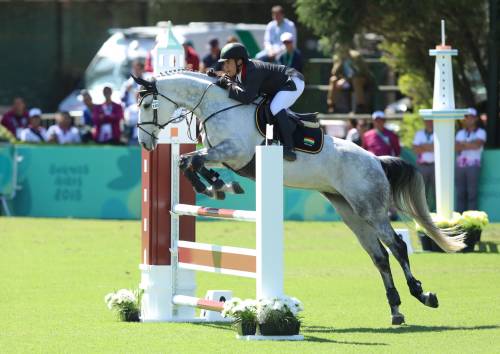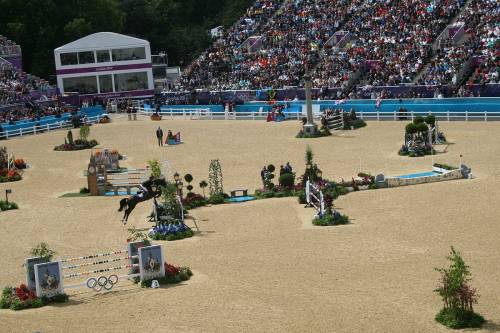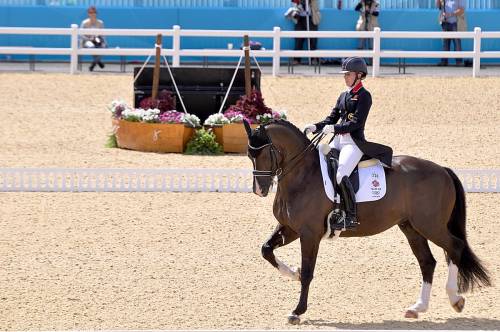Olympic Sports
Our series on Olympic sports in preparation for the Paris Olympic Games this summer continues. Today we focus on equestrian events.
Equestrian sports, which are events where horses are ridden in a competitive nature, were first seen at the Olympic Games at the 1900 Games in Paris but have been included in every Summer Olympics since 1912. Since 1952 in Helsinki, men and women have competed in the same events.
Currently, the equestrian sports included in the Olympic Games are the following: Dressage, Show Jumping, and Eventing. Each discipline has both a team and an individual event. At the Paris Games this summer, the events will take place at the Palace of Versailles. Over 200 riders will compete across the three disciplines. Germany are currently the most successful nation in equestrian sports at the Olympics, often dominating all three events, and they currently hold 28 golds and 56 overall medals, with Sweden coming in second in the medal standings, with 45 medals, 18 of which are gold.
Dressage is an event which requires much precision, poise and accuracy to compete at the top level and it sees both the horse and rider ‘dance’. . Individual riders have the opportunity to perform three separate tests within this competition. The first two tests, the Grand Prix and the Grand Prix Special, act as qualifiers for the final test, the Grand Prix Freestyle. Within all three tests, the horse and rider are judged on a scale from 1 to 10 based on the accuracy and correctness of each individual movement. At the end, scores are converted to a percentage with 100 being the best possible score.
In Team Dressage, scores are decided by adding the individual team member’s scores. The 8 highest scoring teams from the Grand Prix are able to move onto the Grand Prix Special. The Grand Prix special is used to determine the team medals and is performed to music of the rider’s choice. Again, the German’s came out on top in Team Dressage, with Jessica von Bredow-Werndl, Isabell Werth and Dorothee Schneider on the winning side, ahead of the US and Great Britain. Germany will be looking to claim their third consecutive Olympics gold in the 2024 Games.
The Individual Dressage event uses the same scores from the team tests to determine the top 18 riders who then qualify for the Grand Prix Freestyle. At the Tokyo Olympics in the Individual Dressage, Jessica von Bredow-Werndl, riding Dalera, won the gold medal, ahead of compatriot Isabell Werth riding Bella Rose and 2012 and 2016 gold medallist Charlotte Dujardin from Britain on Gio winning silver and Broze, respectively. It is likely the German’s will yet again compete for gold in Paris.
 The next event we will look at is Show Jumping, where horses and riders are asked to complete a timed course of somewhere between 10 and 15 jumps which can be as tall and wide as 2 metres. Riders are penalized for the number of rails that are hit or knocked down, the number of refusals and the number of seconds that they go over the decided optimal time for the course. Ties are broken by competing in a jump-off where penalties are given for the same mistakes and all else equal, the fastest time wins. Unlike Dressage and Eventing, Team and Individual events in Show Jumping are help separately.
The next event we will look at is Show Jumping, where horses and riders are asked to complete a timed course of somewhere between 10 and 15 jumps which can be as tall and wide as 2 metres. Riders are penalized for the number of rails that are hit or knocked down, the number of refusals and the number of seconds that they go over the decided optimal time for the course. Ties are broken by competing in a jump-off where penalties are given for the same mistakes and all else equal, the fastest time wins. Unlike Dressage and Eventing, Team and Individual events in Show Jumping are help separately.
Individual Show Jumping sees rider’s scores decided on their completion of two different courses; the first course is a qualifying round, with the top 30 riders moving onto the second course. Great Britain’s Ben Maher, riding Explosion W, beating out Peder Fredricson from Sweden and Maikel van der Vleuten.
In Team Show Jumping, the rules are similar, riders from the top 10 teams move on to the final course. Individual scores are added up to determine the team scores. If a rider is eliminated or unable to complete the first course, the team is penalized, and the score is determined by the two remaining rider’s scores. If two or more riders from a team do not complete the first course, the team is eliminated. In the final, teams are again scored on the aggregate of all their individual scores and ties are resolved in a jump-off. Sweden came top in Tokyo, with the US claiming their second silver in as many Olympics in the event.
It is always hard to predict who will come out on top in Olympics Equestrian events, as there are many variables, including the horses, which can affect the rider’s performances. This, combined with the skill and technique required in these disciplines, makes it an exciting spectacle to watch.
The final Equestrian discipline to look at in Eventing, which is also known as Three-Day Eventing. It is one of the most demanding disciplines in Equestrian sports, and requires riders and horses to compete in Dressage, Cross Country, and Show Jumping.
The only discipline here not discussed earlier in the article is Cross Country, which sees horses and riders clear a course of obstacles which can be up to 4 miles long and contain 40 obstacles up to 1.4 metres high and wide. Jumps tend to be very solid and resemble natural obstacles such as stone walls, logs, wood tables and ditches. Riders are penalized for not completing the course within the set amount of time and for refusals that they may have on course. A refusal results in a hefty penalty and a rider is eliminated if they have three or more refusals, fall off their horse while on course or jump obstacles out of order.
In Team Eventing each country sends a 4-rider team to compete in all three phases of the eventing competition. Scores for all riders are then added up to determine the team placings and heavy penalties are given for teams containing a rider that did not complete all three phases of the event or was disqualified. The team with the lowest overall score will take the gold. Great Britain put in an amazing performance to claim gold at the Tokyo Games.
In Individual Eventing, places are secured through finishing to the top 25 horse and rider teams in the Team Eventing event. After completing the dressage, cross country, and show jumping phases, the top 25 riders will compete in an additional show jumping competition of 9 obstacles up to 1.3 metres high. Each nation is only allowed to enter up to 3 riders in this competition. Germany’s Julia Krajewski riding Amande de B’Neville, who was a part of Germany’s 2016 silver medal winning Team Eventing team, won the gold in the Individual event in Tokyo last time out. Germany are often strong in this event, and have won the last four golds in this event, so it would be a brave move to bet against a German rider winning the event again.
This year’s Summer Olympics will take place from 26 July to 11 August in Paris, France. You can easily keep up-to-date and stay informed on every equestrian event happening at Paris 2024 by creating a Fixture Calendar account or downloading our App.
Why not also check out our This Week in Sport blog, for a rundown or the top sporting events happening each week or get a useful overview of the 15 most exciting events taking place each month with our Fixture Calendar newsletter here.
Harry Stephens, May 2024
Photos by Sandro Halank, Ben Fitzgerald-O'Connor, Wikimedia